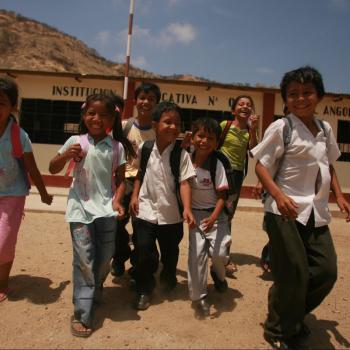
As delegates and stakeholders gather for COP30 in Belém, Brazil, Young Lives is joining with UNICEF, Save the Children, UNFPA and YOUNGO to present negotiators with recommendations aimed at securing a Successful and Meaningful Outcome for Children at COP30.
The Global Goal on Adaptation (GGA) is one of the key items on the agenda at COP30, where governments are expected to adopt a set of indicators that —for the first time—will measure global progress towards strengthening resilience to climate change.
Our joint Policy Brief contains three sets of specific recommendations:
- Close the gaps on children’s health, nutrition and education in the GGA indicator framework. The current list of 100 potential indicators on the table at COP30 includes several references to children, but we recommend five small but very important amendments that would help fill remaining gaps and strengthen the ability to track reductions in children’s climate vulnerability, particularly in relation to health (including mental health), education and nutrition.
- Adopt an ambitious, balanced and complete list of indicators. A successful GGA outcome at COP30 depends on the adoption of a robust and coherent set of indicators. This should include 'indicators that reflect the unique vulnerabilities of children to climate change impacts across the thematic targets and, potentially, cross-cutting indicators related to education and the health of children and young people,' as agreed last year at COP29 in Baku. As the proposed 100 indicators are closely interlinked, any substantial modification or reduction risks undermining governments’ ability to monitor progress towards the GGA targets.
- Provide guidance on next steps for the effective operationalisation of the indicators. Looking ahead, it is essential that the roadmap established by governments to operationalise the GGA indicators includes specific measures to support child-sensitive data collection and capacity building, and ensure the prioritisation of children and other vulnerable groups in the national and global monitoring of GGA targets. And it is critical that technical work on the indicators continues after their adoption at COP30, in collaboration with UN agencies and other organisations and stakeholders with the relevant expertise and experience.
Young Lives is closely monitoring the negotiations at COP30 and collaborating with colleagues from UNICEF, Save the Children, UNFPA and YOUNGO to advocate for a positive and ambitious outcome for children and young people.

As delegates and stakeholders gather for COP30 in Belém, Brazil, Young Lives is joining with UNICEF, Save the Children, UNFPA and YOUNGO to present negotiators with recommendations aimed at securing a Successful and Meaningful Outcome for Children at COP30.
The Global Goal on Adaptation (GGA) is one of the key items on the agenda at COP30, where governments are expected to adopt a set of indicators that —for the first time—will measure global progress towards strengthening resilience to climate change.
Our joint Policy Brief contains three sets of specific recommendations:
- Close the gaps on children’s health, nutrition and education in the GGA indicator framework. The current list of 100 potential indicators on the table at COP30 includes several references to children, but we recommend five small but very important amendments that would help fill remaining gaps and strengthen the ability to track reductions in children’s climate vulnerability, particularly in relation to health (including mental health), education and nutrition.
- Adopt an ambitious, balanced and complete list of indicators. A successful GGA outcome at COP30 depends on the adoption of a robust and coherent set of indicators. This should include 'indicators that reflect the unique vulnerabilities of children to climate change impacts across the thematic targets and, potentially, cross-cutting indicators related to education and the health of children and young people,' as agreed last year at COP29 in Baku. As the proposed 100 indicators are closely interlinked, any substantial modification or reduction risks undermining governments’ ability to monitor progress towards the GGA targets.
- Provide guidance on next steps for the effective operationalisation of the indicators. Looking ahead, it is essential that the roadmap established by governments to operationalise the GGA indicators includes specific measures to support child-sensitive data collection and capacity building, and ensure the prioritisation of children and other vulnerable groups in the national and global monitoring of GGA targets. And it is critical that technical work on the indicators continues after their adoption at COP30, in collaboration with UN agencies and other organisations and stakeholders with the relevant expertise and experience.
Young Lives is closely monitoring the negotiations at COP30 and collaborating with colleagues from UNICEF, Save the Children, UNFPA and YOUNGO to advocate for a positive and ambitious outcome for children and young people.

